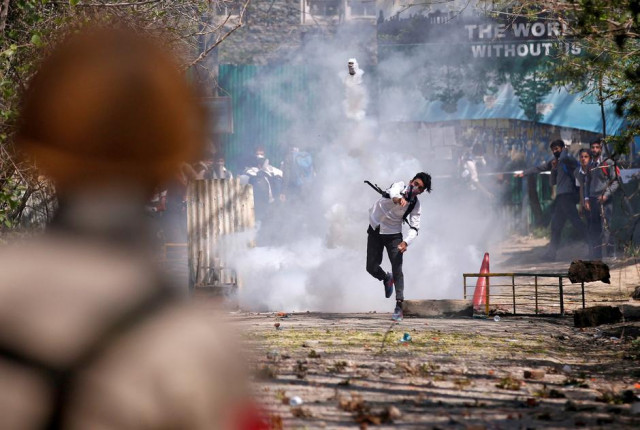Neighbourhood on fire
It is now almost 50 days since IOK was pushed under a complete lockdown with some huge number of Indian soldiers

Riots broke out after the abrogation of Article 370 in Srinagar, Indian Occupied Kashmir. PHOTO: REUTERS.
It is now almost 50 days since IOK was pushed under a complete lockdown with some huge number of Indian soldiers that are armed to the teeth enforcing a deadly curfew, denying access to all kinds of communications to the besieged population.
Meanwhile, the 18-year old war in Afghanistan — which has not known a single day of peace since 1979 when the now-defunct Soviet Union invaded the ill-fated country — continues with the same intensity of 2001 when the US along with Nato sent their boots to the region to chase the Taliban out of Kabul and capture Osama bin Laden.
Facilitated by Pakistan, the year-long peace talks between the Afghan Taliban and US Representative Zalmay Khalilzad spread over nine rounds in Doha before being abruptly declared dead. How President Trump intends to proceed to achieve his objective of pulling out his residual troops from Afghanistan before the start of the US elections remains to be seen.
August and September saw an increase in deadly strikes from both the Taliban and the Afghan government. Some airstrikes were also carried out by the US, resulting in numerous civilian deaths as collateral damage. The Taliban have refused to talk to the Afghan government and have vowed to disrupt the presidential election in the country on September 28. They are estimated to be openly active across 70% of Afghanistan. Both the Taliban and Nato-backed Afghan forces are on the offensive now. In response, Afghan government forces are said to be pushing to recapture territory taken by the Taliban. The elections have been delayed twice. The Taliban fear elections will allow the current government to cement its power. They have attacked campaign rallies and polling sites in previous years.
In the third development, Saudi oil facilities were attacked last Saturday which escalated tensions with Iran, though the Iran-backed Houthi rebels in Yemen claimed responsibility for the attack. However, the US insists that Iran was most likely responsible. President Trump tweeted the day after the attack that the US was “locked and loaded” but watered down the response in the next breath saying that he doesn’t want a war. In 2015, Saudi Arabia launched a campaign to try to roll back a takeover by the Houthis. The war has killed thousands but failed to dislodge Houthi control of the capital and much of the country.
All the three centres of turmoil — IOK, Kabul and Tehran — seem to have entered a blind alley. One can only wait for the Afghan Election Day to pass as there seems to be no hope of resumption of talks before that. The US has enhanced sanctions against Tehran immediately following the attacks on Saudi oilfields, signalling worsening relations between the US and Iran, and Iran and Saudi Arabia.
One however, hopes that President Trump would be able to, as he has promised, mediate between India and Pakistan when the two prime ministers — Imran Khan and Narendra Modi — visit New York next week, and help de-escalate the situation between the two nuclear-armed neighbours.
President Trump could retrieve the Manmohan-Musharraf formula from the files and use it to initiate the mediation process. This formula has four elements — borders will not change, but Kashmiris will be allowed to move freely across it; a phased withdrawal of the military on both sides; more autonomy from Islamabad to AJK, and from Delhi to IOK; and a joint mechanism for the “supervision” of J&K.
However, for talks to resume between New Delhi and Islamabad, India should first undo all the undemocratic actions it has taken since August 5. It should initiate talks with the Hurriyat leadership on the side and give them a seat at the peace talks, making it a trilateral process for a final and permanent settlement acceptable to all concerned.
Published in The Express Tribune, September 21st, 2019.
Like Opinion & Editorial on Facebook, follow @ETOpEd on Twitter to receive all updates on all our daily pieces.














COMMENTS
Comments are moderated and generally will be posted if they are on-topic and not abusive.
For more information, please see our Comments FAQ